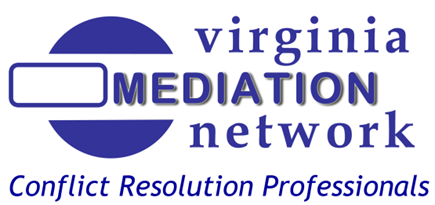|
The Virginia Mediation Network is a 501(c)6 non-profit organization.
Disclaimer of Liability and Endorsement: While the Virginia Mediation Network strives to make the information on this website as informative, neutral, accurate and timely as possible, VMN makes no endorsement of, promises about, guarantees or opinions related to the accuracy or adequacy of the contents of the third-party seminars. VMN expressly disclaims any liability for the content of said presentations. Any opinions expressed by third-party presenters, whether members of VMN or not, are not expressed as the opinion of the organization itself. Reference on this website to any specific commercial product, process or service, or the use of any trade, firm or corporation name is for the information and convenience of the public, and does not constitute endorsement, recommendation, or favoring by the Virginia Mediation Network.
